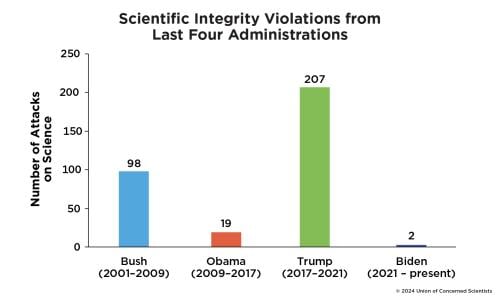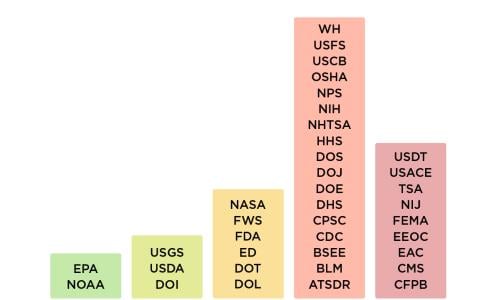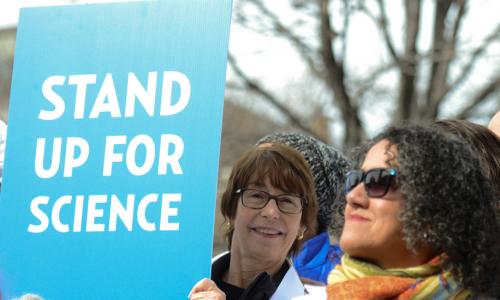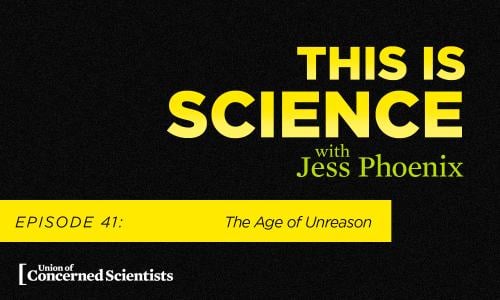Strong scientific integrity policies help ensure that the science that guides government decisions is independent, trustworthy, and free of political influence. But federal agencies vary widely in the strength of their scientific integrity policies, and many critical agencies are falling short of the policies we need.
The scientific work of the federal government is vital to the lives of people across the country and around the world—including everything from severe weather forecasting to pollution monitoring and food safety inspection to medical research and efforts to track and fight epidemic disease.
More than 300 attacks on science have occurred over the past four presidential administrations, and an administration that fails to uphold the principles of scientific integrity and allows political interference to undermine science could endanger the health and safety of millions.
This report examines the progress in scientific integrity at 38 major agencies, all of which have seen attacks on science coming from political leadership. The report evaluates whether each agency has an updated scientific integrity policy, whether the agency has named a scientific integrity officer and provided a channel to contact that officer, and whether the agency has clearly reported the number and outcome of scientific integrity investigations. It also offers recommendations for the next presidential administration to improve scientific integrity policies and make sure these policies can be effectively implemented and enforced.
Protecting Government Science from Political Interference
This is an online version of the executive summary. For the full report, please download the report PDF.
The outcome of the 2024 presidential election will profoundly affect the ability of federal agencies to use science-based decisionmaking to protect the nation's communities. Whoever is elected, one thing is clear: an administration that fails to uphold the principles of scientific integrity and allows politics to undermine science will endanger the health and safety of millions.
Protecting Government Science from Political Interference: A Blueprint for Defending Scientific Integrity and Safeguarding the Public, a new report from the Center for Science and Democracy at the Union of Concerned Scientists, recommends what the next presidential administration can and should do to strengthen the state of scientific integrity at federal agencies.
In its analysis of the implementation of scientific integrity policies at federal agencies, the report points to serious gaps. Although the current administration has fostered impressive advances in this regard, many agencies are woefully ill-prepared to implement some of the most basic and fundamental aspects of scientific integrity policies and procedures.
Violations of Scientific Integrity Are an Ongoing Problem
Science is at the heart of how government functions. Federal agencies use robust research every single day to protect the health and safety of millions of people. Since at least the 1950s, some political leaders, during both Democratic and Republican administrations have interfered with science-based processes at federal agencies. Moreover, many violations of scientific integrity have disproportionately affected Black, Indigenous, people of color communities, low-income communities, and other historically marginalized populations. Due to redlining and other systemic racist practices, underserved communities already face higher exposures to air pollution, toxic chemicals, and other environmental hazards; any politicized dismantling of science-based protections can lead to further health harms in these communities.
Overall, UCS has documented 326 examples of politics undermining government science across the last four presidential administrations. Political leaders have buried reports or edited out the scientific content on topics ranging from mercury emissions from power plants to voter fraud, from tipping for waiters to COVID-19, and from sex trafficking in Indigenous communities to fatal truck collisions with pedestrians and cyclists.
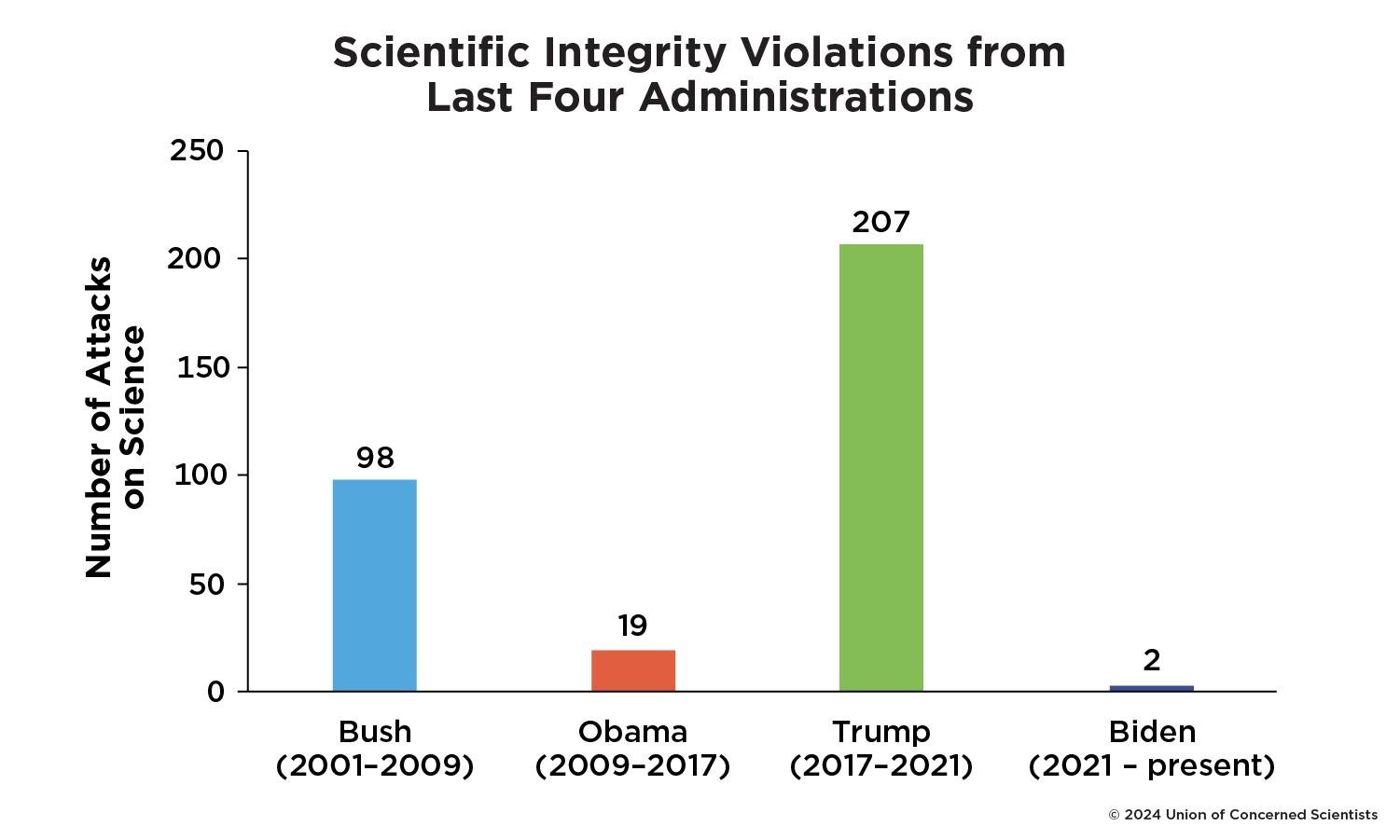
UCS has documented 326 attacks on science across four presidential administrations. The vast majority (207; 63 percent) took place during the Trump administration—even though the Bush and Obama administrations were twice as long as the Trump administration.
Many Agencies Fail to Implement Basic Scientific Integrity Protections
UCS analyzed 38 federal agencies based on three metrics: publication of a recently updated scientific integrity policy; designation of a scientific integrity official, with a straightforward way to contact that person; and annual reporting of the number and outcomes of investigations into potential scientific integrity violations. President Biden's 2021 memorandum and the White House's 2023 framework on scientific integrity require all agencies to carry out these actions in a public and timely manner.
Overall, 27 of the 38 agencies (71 percent) showed low or, in some cases, nonexistent compliance with the 2021 memorandum.
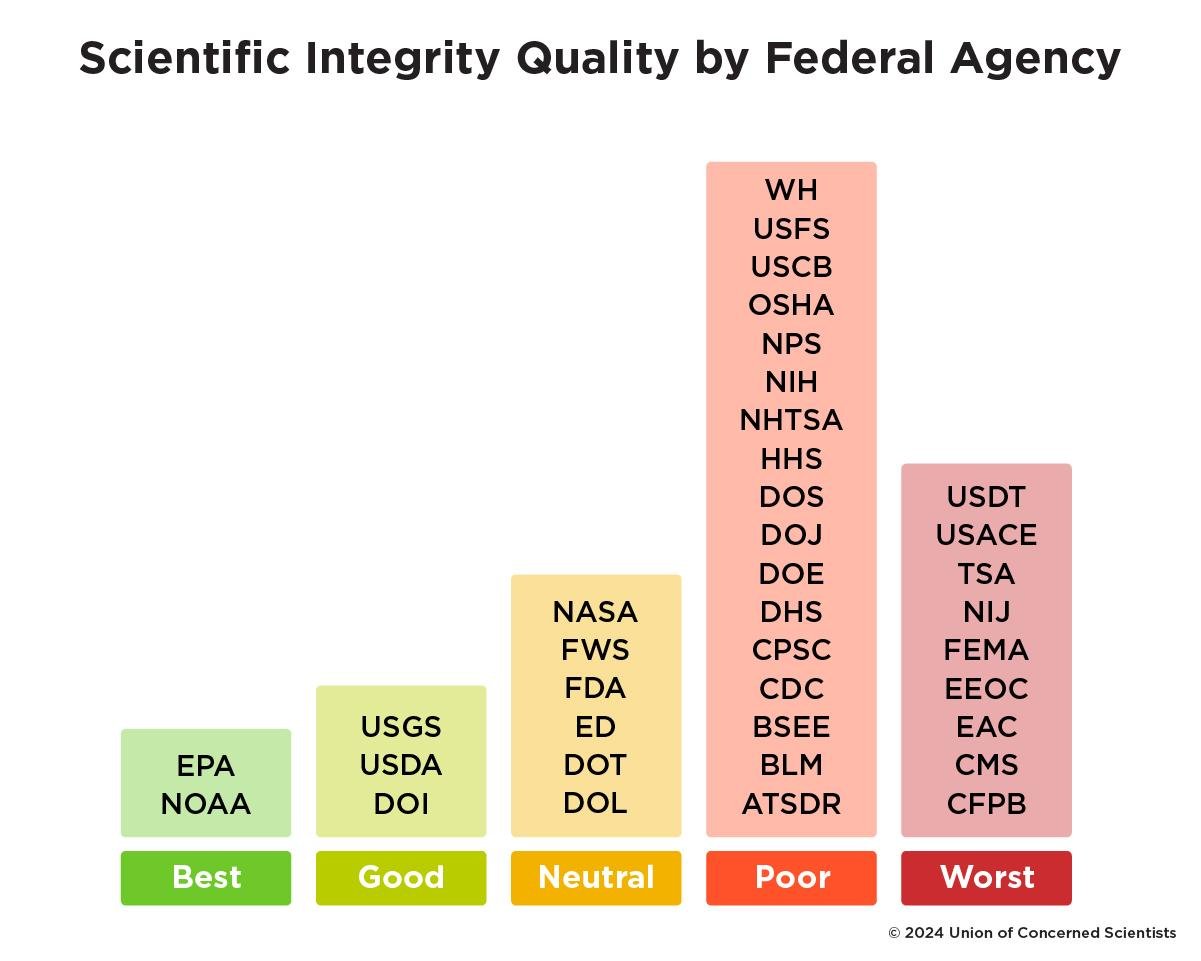
Out of 38 agencies examined, 71 percent (27 agencies) received overall scores of either "poor" or "worst." Thirteen percent (five agencies) received overall scores in the categories of "best" and "good." For a list of the acronyms, download the full report.
The Next Presidential Administration Needs to Do Better
Even in a highly polarized political climate, protecting scientific integrity should not be a partisan issue. Science is essential to how government fulfills its duty to its people, making strong scientific integrity protections at federal agencies necessary for good governance. The goal of basing policy decisions on the best, most up-to-date, and most reliable scientific information, derived independently and unfettered by political interference, deserves overwhelming bipartisan support.
Recommendations for the Next Presidential Administration
A strong culture of scientific integrity adds resiliency in the face of political interference in science. It also protects federal scientists as they fulfill their responsibilities to the public, and it promotes fully informed decisionmaking.
To promote a strong culture of scientific integrity, each federal agency should:
-
Ensure open communication with the press and the public.
-
Remove language in scientific integrity policies that may unintentionally lead to censorship or self-censorship.
-
Educate federal workers on their rights and responsibilities.
-
Increase opportunities for staff to be trained and educated on scientific integrity.
Recommendations for Ensuring Robust Implementation and Enforcement
As agencies adopt or update scientific integrity policies, they must systematically evaluate the processes for implementing them, investigate allegations of compromised scientific integrity, and enforce penalties for violations.
To safeguard scientific integrity, each agency should:
-
Hold violators of scientific integrity fully to account.
-
Clarify the timeline for investigating potential scientific integrity violations.
-
Protect employees against retaliation when they report or investigate scientific integrity violations or submit whistleblower accounts.
-
Clarify its responsibility for upholding scientific integrity.
Recommended Legislation
The report recommendations focus on the executive branch, yet Congress also plays an important role in strengthening scientific integrity in the federal government. Specifically, UCS supports passage of the Scientific Integrity Act, the Stop Corporate Capture Act, and the A. Donald McEachin Environmental Justice for All Act. The Scientific Integrity Act would be particularly powerful, helping ensure protections for scientific integrity across all presidential administrations and opening the door to stronger forms of enforcement and accountability.
For more information, including additional recommendations, please download the full report.
Downloads
Citation
Desikan, Anita. 2024. Protecting Government Science from Political Interference: A Blueprint for Defending Scientific Integrity and Safeguarding the Public. Cambridge, MA: Union of Concerned Scientists. https://doi.org/10.47923/2024.15597
